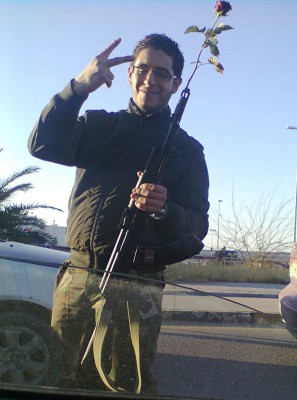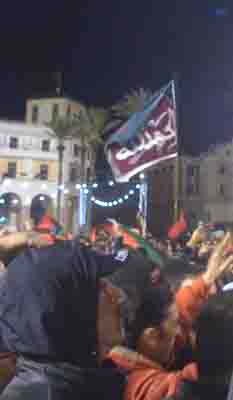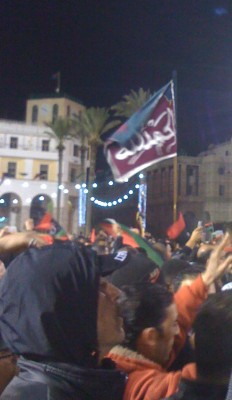Across the country Libyans took to the streets on Thursday to celebrate the first anniversary of the 17 February Revolution that . . .[restrict]started a year ago but took eight months and tens of thousands of lives to overthrow the hated Qaddafi regime.
The celebrations were spontaneous. None was organized by the government. The only action by the government was the announcement that Saturday is to be public holiday.
In Tripoli the festivities were a little slower to start with but it was soon the same story. For the past couple of days, residents had been hanging flags in the streets. On Thursday morning people were still doing so. But by the afternoon, the city was full of them — of all sizes.
More remarkable was the traffic. By mid afternoon, there was a steady river of flag-bearing, car-horn hooting vehicles in almost every street of the capital. By early evening it had become a mighty, noisy flood. Streets were blocked with traffic, intersections were gridlocked. A five-minute car journey turned into an hour one. It appeared that everyone had decorated their vehicles in flags and was trying to drive around the city. Children hung out of car windows waving flags; radios blasted revolution songs. The cry of “Allahu Akhbar” was everywhere.
Tripoli was very much in full celebration. In some places there was, quite literally, dancing in the streets. With their radios at full volume, young men got out of their blocked cars and danced to the music.
On a couple of occasions cars were seen bumping into each other in the congested traffic. Normally it would result in shouting and accusations. Not on Thursday evening. Drivers got out, greeted each other, laughed at the slight damage and shock hands.

In the now renamed Martyrs Square large numbers of people gathered,flags were waved in abundance (among them the Amazigh flag as well as that of the Syrian opposition), fireworks were let off, music played and stall holders selling candy floss, popcorn, flags and tricolor-decorated objects — balloons, key rings, wrist bands and the like — did a roaring trade. At one point a large, slow-moving procession of chanting Sufis, mainly young men, accompanied by pipes and drums, flowed into the square from Shara Istiklal. They were joined by many others in the square.
Mingling among the crowd was Deputy Prime Minister Mustafa Abushagur Al-Ghaith, clearly enjoying the event. He was soon buttonholed by individuals keen to make a political point.
It was the same all over the city. In Fashloum district, scene last year of determined opposition to Qaddafi, the main street was impassable, so great were the crowds. Brigadesmen were on duty diverting the traffic.
Significantly absent, though, was the celebrationary gunfire that had been a permanent sound at night until very recently.
The festive atmosphere was very different to what had been predicted in some quarters. Irritation at what some saw as the slow place of reform and the lack of transparency had resulting in growing criticism of the NTC and government. A couple of weeks ago, Libyans were tweeting and text-messaging that the anniversary would produce a fresh angry uprising. From his exile in Niger, Saadi Qaddafi tried to jump on the bandwagon, claiming in a TV interview that the country was ready to rise up and that he would return.
Fears that there might be trouble kept some expatriates, mainly Africans, at home on Thursday and Friday. Security was well in evidence in and round Tripoli for much of the week with brigadesmen mounting roadblocks and checking vehicles in search of any guns and bombs. In Martyrs Square on Thursday evening, the security presence was there if less obvious.
In the event it probably was not needed. The scale of celebration across the capital and country clearly demonstrated massive support for both the revolution and the NTC.
In Tripoli’s Martyrs Square the happiness on people’s faces was evident. Qaddafi’s stage-managed and paid-for events in the same square never even matched it.
[/restrict]










